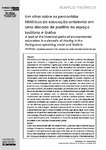Mostrar o rexistro simple do ítem
Un ollar sobre os percorridos históricos da educación ambiental nunha década de compartir noespacio lusófono e Galicia
| dc.contributor.author | Borges, Aidil | |
| dc.date.accessioned | 2020-06-01T08:23:03Z | |
| dc.date.available | 2020-06-01T08:23:03Z | |
| dc.date.issued | 2019 | |
| dc.identifier.citation | Borges, A. (2019). Un ollar sobre os percorridos históricos da educación ambiental nunha década de compartir noespacio lusófono e Galicia. AmbientalMENTEsustentable, 26(1-2), 15-22. https://doi.org/10.17979/ams.2019.26.1-2.6518 | es_ES |
| dc.identifier.issn | 1887-2417 | |
| dc.identifier.uri | http://hdl.handle.net/2183/25660 | |
| dc.description.abstract | [Resumo] Decorridos pouco mais que uma década da criação da Rede Lusófona e da realização regular dos encontros e Congressos lusos, sob o pano de fundo da Educação Ambiental nos oito territórios e regiões que compõe a comunidade lusófona, eis que aproveitamos deste momento para um olhar retrospetivo dos percorridos históricos dos congressos lusófonos, que aconteceu durante as II Xornadas Internacionais de Educación Ambiental do Centro de Extensión Universitaria e Divulgación Ambiental de Galicia-CEIDA, em abril de 2018, no Castelo de Santa Cruz em Liáns, Oleiros, A Coruña. Sobrevoando sobre essa década decorrida da realização do primeiro congresso de Santiago de Compostela, seguidos dos de, Cuiabá, Murtosa e ilha do Príncipe, bem como a institucionalização dos encontros lusófonos regulares, em vários palcos de territórios lusos, com algum distanciamento pelo tempo percorrido, podemos afirmar que estes encontros trouxeram à comunidade um momento único de partilha, pondo a tónica na importância do debate cultural e no fortalecimento da Educação Ambiental, no cruzamento de diálogos entre os diferentes atores, conceitos e métodos, conhecimento das inúmeras experiências, vivências e políticas públicas. Passou-se em revista nestes encontros, o Estado geral das Artes, fez-se uma radiografia das verdadeiras identidades que pulsam e sobrevivem nestes territórios lusófonos dando voz aos diferentes grupos sociais para a construção de uma política social inclusiva do ponto de vista ecológico. Na atual conjuntura, tendo em conta os novos desafios e questionamentos que a nossa sociedade enfrenta, urge agora traçar novos rumos para que de forma firme e determinado se possa posicionar e travar o status quo, com uma estratégia Glocal (contração do global e do local), fortalecida em uníssono como o único caminho para juntos, enfrentarmos e vencermos as atuais adversidades que a sociedade se nos interpela no atual cenário global. | es_ES |
| dc.description.abstract | [Abstract] A little more than a decade after the creation of the Lusophone Network and the regular holding of Portuguese meetings and Congresses, under the backdrop of Environmental Education in the eight territories and regions that make up the Lusophone community, here we take advantage of this moment for a retrospective look at the historical tours of the Portuguese-speaking congresses, which took place during the II International of Environmental Education at the Centro de Extensión Universitaria and Divulgación Ambiental de Galicia-CEIDA, in April 2018, at the Santa Cruz Castle in Liáns, Oleiros, A Coruña. Flying over this decade after the first Santiago de Compostela congress, followed by those from, Cuiabá, Murtosa and Príncipe island, as well as the institutionalization of regular Portuguese-speaking meetings, on various stages in Portuguese territories, with some distance for the time passed, we can say that these meetings brought the community a unique moment of sharing, emphasizing the importance of cultural debate and the strengthening of Environmental Education, at the intersection of dialogues between different actors, concepts and methods, knowledge of the countless experiences, experiences and policies public. The General State of the Arts was reviewed at these meetings, a radiography of the true identities that pulsate and survive in these Portuguese-speaking territories was given, giving voice to different social groups to build an inclusive social policy from an ecological point of view. In the current conjuncture, taking into account the new challenges and questions that our society faces, it is now urgent to trace new directions so that in a firm and determined way it can position and stop the status quo, with a Glocal strategy (contraction of the global and the local), strengthened in unison as the only way for us to face and overcome the current adversities that society challenges us in the current global scenario. | es_ES |
| dc.language.iso | por | es_ES |
| dc.relation.uri | https://doi.org/10.17979/ams.2019.26.1-2.6518 | es_ES |
| dc.rights | Atribución-CompartirIgual 4.0 España | es_ES |
| dc.rights.uri | http://creativecommons.org/licenses/by-sa/3.0/es/ | * |
| dc.subject | Educação ambiental | es_ES |
| dc.subject | Comunidade lusófona | es_ES |
| dc.subject | Congressos lusos | es_ES |
| dc.subject | Territórios lusófonos | es_ES |
| dc.subject | Environmental education | es_ES |
| dc.subject | Portuguese-speaking community | es_ES |
| dc.subject | Portuguese congresses | es_ES |
| dc.subject | Portuguese-speaking territories | es_ES |
| dc.title | Un ollar sobre os percorridos históricos da educación ambiental nunha década de compartir noespacio lusófono e Galicia | es_ES |
| dc.title.alternative | A look at the historical paths of environmental education in a decade of sharing in the Portuguese-speaking world and Galicia | es_ES |
| dc.type | info:eu-repo/semantics/article | es_ES |
| dc.rights.access | info:eu-repo/semantics/openAccess | es_ES |
| UDC.volume | 26 | es_ES |
| UDC.issue | 1-2 | es_ES |
| UDC.startPage | 15 | es_ES |
| UDC.endPage | 29 | es_ES |






